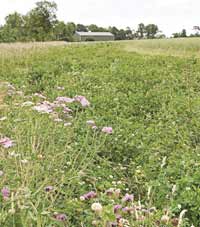Farmers voluntarily putting biodiversity measures in place

Plant breeding technology, disease management and agri-environment schemes caught James Andrews’ eye at the Crop Protection in Northern Britain conference in Dundee
Signing up to an environmental scheme might not have any impact on a farm’s biodiversity, because many farmers are already putting biodiversity measures in place voluntarily, a recent study in Scotland has revealed.
The joint Game and Wildlife Conservation Trust and Scott Wilson Group study compared 230 farms in the Countryside Premium Scheme (CPS), the Rural Stewardship Scheme (RSS) and Organic Aid (OAS) with the same number of similar non-scheme farms, said Game and Wildlife Conservation Trust senior scientist Dave Parish.
Over the five-year project, which was completed in 2008, changes in numbers of bird species, ground invertebrates, butterflies and vegetation were monitored, but there was no evidence that the schemes delivered a significant increase in biodiversity over the term, he explained.
It showed that a large number of farmers were already increasing biodiversity on their farms, said Dr Parish. “I think a lot of farmers were receiving payment for activities they were doing already.”
Managing land for game and promoting wildlife for personal interest were the most common reasons for farmers to add environmental measures, he suggested. And some had features from previous schemes, he noted.
The findings will encourage leaders of the Campaign for the Farmed Environment that farmers will adopt environmental measures voluntarily, which is one of the cornerstones of the campaign.
But environmental schemes were still an important tool for increasing biodiversity, said Dr Parish. “The prescriptions in the schemes do work, it just so happens that many of the farmers in the study had put them in place before joining the schemes.”
If schemes targeted farmers with less regard for biodiversity rather than the best there would be a greater improvement, he suggested. “The problem is they pick the cream of the crop.”
Rewarding success and letting farmers achieve wildlife targets by their own methods may be more successful, he noted. “Farmers know their farms better than anyone and are best placed to decide what works and what doesn’t.”
| Rural Stewardship results |
|---|
| Bird numbers were higher on RSS farms than their non-scheme partner farms, said Mr Parish. RSS farms supported more birds of more species than their non-scheme partner farms, but they were also higher before they entered the scheme, he said. “They had 33% more birds in 13% more species.” |
Read more from the 2010 Crop Protection in Northern Britain Conference
• Industry must take harder line on disease control• Seed treatment promises scab control
• PCN sampler cuts waiting time
• GM technology will help potato meet demand
